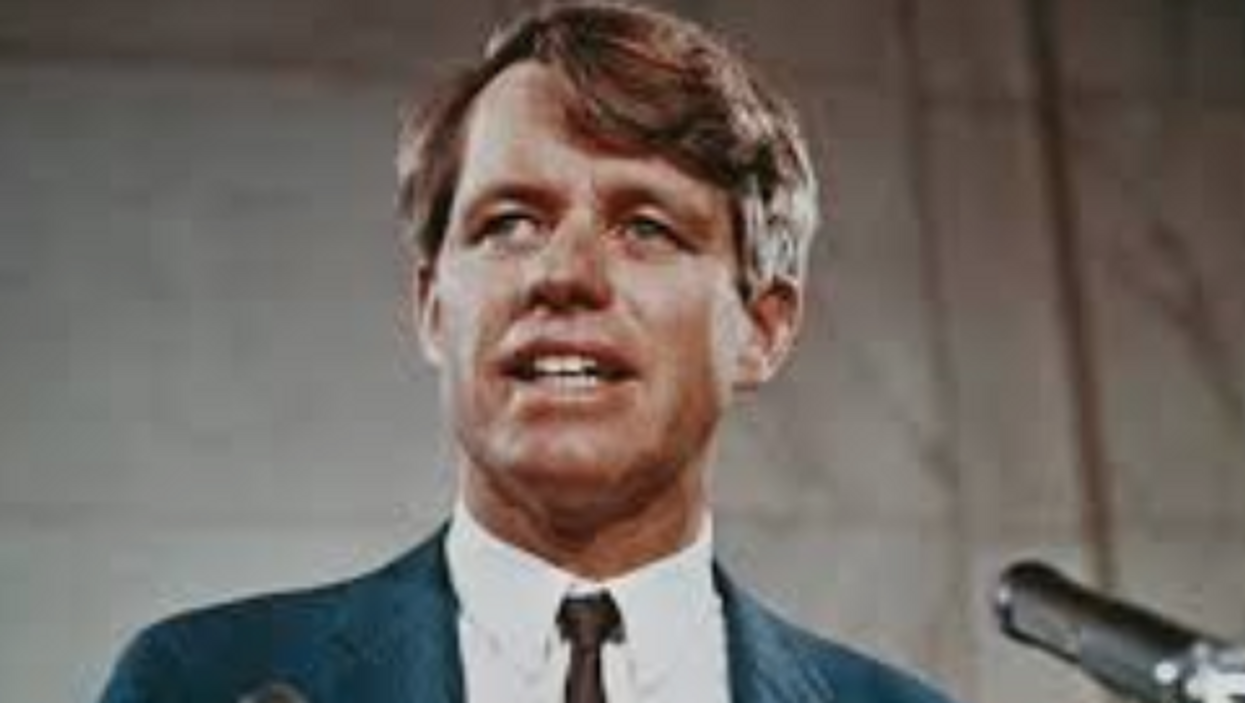How RFK Junior's Farcical Campaign Betrays The Kennedy Legacy
When a neophyte named Edward Moore Kennedy first ran for the Senate in 1962 at barely 30 years old, his primary opponent delivered a debate quip that still echoes.
"If your name were Edward Moore," cracked Ed McCormack, then Massachusetts attorney general, "your candidacy would be a joke." Ted Kennedy won that primary, ascended to the Senate, and then spent a lifetime winning over skeptics with hard work and liberal commitment.
But that harsh zinger could score a bullseye on a different target now: Uncle Teddy's errant nephew Robert Francis Kennedy Jr., the grifting anti-vax lawyer and conspiracy monger whose campaign for president of the United States should be a joke — and certainly would be if his name were merely Robert Francis.
The difference is that RFK Jr., seeking public office for the first time, isn't 30. He is 70, a senior citizen, with a long and checkered record whose bright spots are overshadowed by menacing darkness. Far from upholding the values his family represents or the legacy of his martyred father and uncle, Bobby Jr. is an opportunist whose ambition, greed, dishonesty and arrogance have led him far astray.
There was a time many years ago when, as an environmental lawyer, Kennedy did useful work — usually under the tutelage of wiser heads — after he emerged from the drug addiction that followed his father's murder. At one point, I even wrote an admiring magazine profile of him.
But not too many years later, Bobby began the deceptive anti-vaccine campaign that has marked his moral and intellectual decline ever since. Having authored articles claiming childhood vaccines cause autism, he clung to their refuted arguments and falsified data long after the magazines were forced to withdraw them. He insists those lies are true to this day — and the anti-vax propaganda from which he profits is leaving American kids vulnerable to disease.
How would his late uncle John F. Kennedy, whose memory he so often invokes in his current campaign, react to what Bobby has done? In 1961, President Kennedy worried that resistance to the polio vaccine, which was still rather new, meant millions of schoolchildren might contract that deadly and crippling virus.
At a press conference that April, the president said: "I hope that the renewed drive this spring and summer to provide vaccination for all Americans, and particularly those who are young, will have the wholehearted support of every parent in America."
The following year, JFK pushed through the Vaccination Assistance Act, which financed immunization drives in every state for polio, diphtheria, pertussis and tetanus. That massive campaign established the federal government as the central authority in establishing and coordinating immunization policy for the nation — a role Robert Kennedy Jr. has persistently sought to undermine or even abolish, at potentially enormous cost.
Bobby's betrayal of his family goes further with every step he takes in this campaign, and in every direction. JFK and RFK were both known for surrounding themselves with advisers whose intelligence and experience drew admiration; Bobby is drawn to intellectually null sycophants and boobs, including a large contingent of crooks like Steve Bannon and Roger Stone, as well as the anti-vax scammers, some of whom are outright fascists. These are people his father and uncle would have privately mocked and publicly shunned.
Even worse, Bobby has become a shill for Russian propaganda and an opponent of American military aid to Ukraine's besieged democracy. We don't have to wonder what his uncle would have said, because history tells us.
In his inaugural address, JFK uttered this indelible sentence: "Let every nation know, whether it wishes us well or ill, that we shall pay any price, bear any burden, meet any hardship, support any friend, oppose any foe to assure the survival and the success of liberty." Liberty doesn't mean surrendering to Putin and abandoning our allies.
Lately, Bobby has been sucking up to the Libertarian Party, whose platform would tear down all the achievements of his father and both of his uncles in civil rights, education, health care, environmental protection, food security and a score of essential programs. He wants their ballot line, and he is willing to promote their destructive ideology for his own benefit.
In this campaign, he has reversed the old epigram about history and its personages. In the first act, he presents a farce — and in the second act, should he help to elect Donald Trump, he will bring forth a tragedy.
Joe Conason is founder and editor-in-chief of The National Memo. He is also editor-at-large of Type Investigations, a nonprofit investigative reporting newsroom formerly known as The Investigative Fund, and a senior fellow at Type Media Center.




